Political Ideologies - Feminism | 11th Political Science : Chapter 8 : Political Ideologies - Part-II
Chapter: 11th Political Science : Chapter 8 : Political Ideologies - Part-II
Feminism
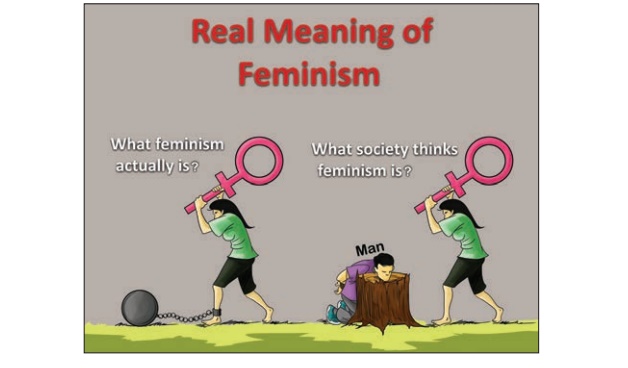
Feminism
Feminism refers to the movements and ideologies that strive to promote empowerment of women so that they achieve equality with men. Feminist schools of thought emerged on the horizon of Modern Political Theory from the last decades of the 19th century. It was propelled by scientific realisation about the innate capability and equality of women with men
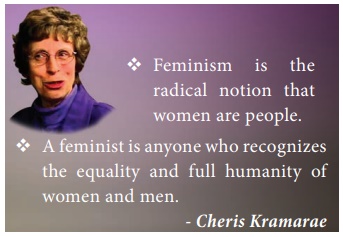
There are different feminist schools of thought that can be broadly
categorized as;
A. Liberal Feminism
B. Marxist Feminism
C. Radical Feminism
D. Eco Feminism
E. Post-Colonial Feminism
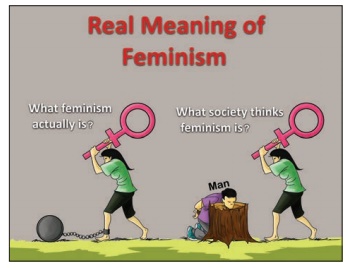
A. Liberal Feminism
The feminist movement, in its infant stage in the late 19th century,
advocated equal political rights for women. It believed that the subordination
of women in society could be rectified with electoral enfranchisement of women
and endowment of other political and economic rights. The State was considered
to be a gender neutral institution. Therefore granting of voting rights to
women will culminate in the fruition of women development. The greatest feat of
liberal feminism lies in winning voting rights to women in the democratic
western countries.
B. Marxist Feminism
It placed gender inequality and exploitation in the origin of private
property from the second stage of human history called Ancient Slave Society.
Friedrich Engels, a close associate of Karl Marx, wrote the book “The Origins
of The Family, Private Property and the State”. He argued that subordination of
women emerged with the rise of private property as men controlled the property
and used it to establish their domination over women. The struggle for women
liberation should take place simultaneously with the struggle for liberation of
the working class. Marxist revolution will lead to the destruction of capitalism
and the establishment of communism where there will be no private property.
There will be equality among not only men but also between men and women
C. Radical Feminism
There are no innate differences between men and women and women came to
be subjugated deliberately for the purpose of exploitation, is the ideological
crux of Radical Feminism.
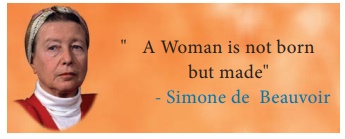
Simone de Beauvoir, the famous radical feminist and author of the work
“The Second Sex”, asserted that “A woman is not born but made”. Both woman and
man are endowed with same capacities when they are born. Male-dominated society
and culture known as patriarchy creates through indoctrination the inequality
between them. The differences in gender are created artificially and unjustly. We
can understand this assertion when we note the enormous differences in the
status and position accorded to women among the cultures of the world.

Carole Hanisch, a famous Radical Feminist, brought out the most
important slogan of Radical Feminism - Personal is Political - to reveal
patriarchal domination over women. The liberal politics divides the activities
of humankind into personal and public domains. The personal domain is
considered to be a sphere of personal life where family operates. It is
believed that there is no scope for conflict and domination in this sphere and
only love, affection and empathy are relevant. Women live in the personal
sphere and therefore there is no need for political rights, power and authority
for women.
But the public domain is a sphere of struggle, competition and therefore
politics. This domain is dominated exclusively by men. Therefore, men alone
participate in politics and possess political power.
Radical Feminism repudiates the above liberal exposition and asserts that private and personal domain is also subject to politics. The relationship between man and women in personal domain is not always characterised by the considerations of love and affection. Even here struggle, competition and domination operate. For example the relations between husband and wife and a brother and sister are not always friendly and affectionate.
Struggle and competition can also be found in them. Therefore, we should
speak about politics, women rights, gender equality in personal domain too.
Radical Feminism argues for a revolutionary re-ordering of society and politics
to implant gender equality in personal and public domains.
D. Eco Feminism
Eco Feminism provides a feminist interpretation of nature. The two
ideologies of Feminism and Environmentalism are fused in Eco Feminism. It
argues that patriarchy is the root cause of environmental degradation and women
exploitation. The important architects of Eco Feminism are Francoise
D’Eaubonne, Rosemary Ruether, Ynestra King and Vandana Shiva.
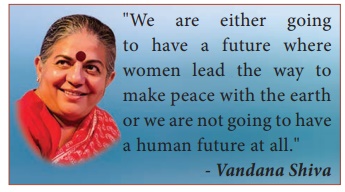
There are two schools of thought in Eco Feminism. They are Radical Feminism and Cultural Feminism. Radical Feminism asserts that patriarchy or male-dominated
system subjugates and degrades both environment and women. Male domination of
society must be eliminated to realise the twin objectives of environmental
preservation and women empowerment.
The other school, Cultural Feminism argues that
women are closer to nature as both are food providers and play indispensable
role in biological reproduction. The environmental degeneration affects
women more than men. The division of work between the two genders leaves women
more disadvantaged in the age of environmental crisis. They suffer more as in
male dominant societies they are given the responsibilities directly linked
with nature.
E. Post-Colonial Feminism
Post-Colonial Feminism arose as an ideology and movement in the 1980s in
the countries of Asia and Africa that were formerly enslaved in colonialism.
Audre Lorde contributed to the emergence of Post-Colonial Feminism in one
masterpiece essay “The Master’s Tools Will Never Dismantle the Master’s House”.
Gyatri Spivak, Chandra Talpade Mohanty and Ethel Crowley are important
Post-Colonial Feminists.
Audre Lorde said, “To imply,
however, that all women suffer the
same oppression simply because we are women is to lose sight of the many varied
tools of patriarchy. It is to ignore how those tools are used by women without
awareness against each other… As an African-American woman in White patriarchy,
I am used to having my archetypal experience distorted and trivialised.”
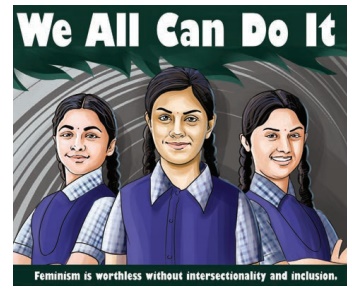
It revolts against the western feminist movements’ attempts at
universalizing their experience. Women do not constitute a single and
homogenous category as they are differentiated by a host of factors like class,
race, religion and country. The mainstream feminism suffers from several
deficiencies when applied to non-western societies The Post-Colonial Feminism criticises
the negative impact of western colonialism on the social economic and political
universe of women in Asia and Africa, a realty that was ignored and never
experienced by the mainstream feminist thought. They had experienced racism,
slavery, forced migration and numerous other evils that make them different
from the Western women.
It also condemns the projection of the western women as educated,
politically-conscious, modern and empowered and non-western women as passive,
powerless victims. Post -Colonial Feminism argues that women in these societies
are victims of double colonisation represented by the exploitative forces of
colonialism and patriarchy. Post-Colonial Feminism castigates the visible
indifference of the mainstream post colonial political thought to the peculiar
sufferings of the women in their societies and countries.
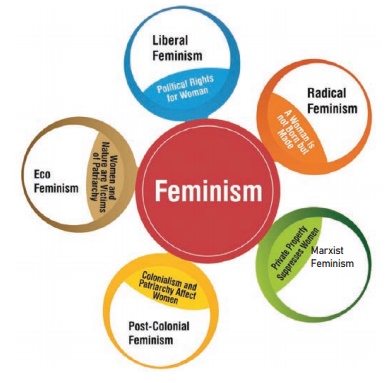
Indian State and Women Empowerment
Not only feminism but all recent theories in political science emphasise
the need to promote gender equality and women empowerment. Indian State had
implemented certain crucial measures for protecting women.
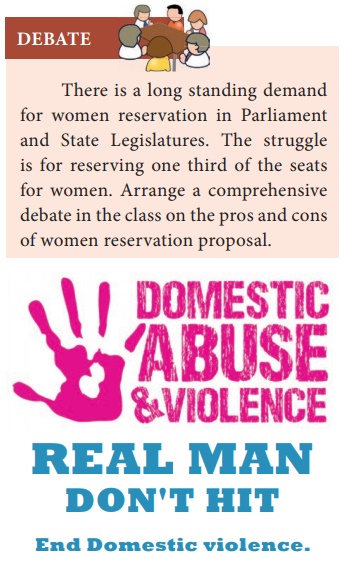
The 73rd and 74th Constitutional Amendment Acts reserve one-third of the
seats in panchayat and urban local bodies for women. The implementation of
reservation in elected local bodies in the last two decades has led to
political empowerment of women. The Supreme Court of India had provided
‘Vishakha Guidelines’ to protect women from sexual harassment in working
places. Accordingly, the Union government enacted The Sexual Harassment of
Women at Workplace (Prevention, Prohibition and Redressal) Act, 2013. The Act
establishes Internal Complaints Committee and Local Complaints Committee to
provide redressal to women seeking justice from sexual harassment in their
workplace. Parliament had earlier passed The Protection of Women from Domestic
Violence Act, 2005 to provide justice and protection from violence within their
homes.
In conclusion, one can say gender equality paves way for empowerment of
the half of humankind.
Related Topics